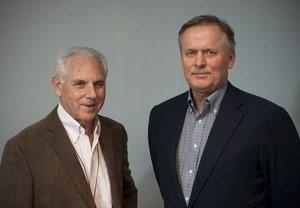
A new book by bestselling author John Grisham is giving new impetus to a handful of companies striving to develop what they say could be a trailblazing treatment for cancer and Alzheimer's disease.
 |
| Author John Grisham (R) and Neal Kassell, neurosurgeon and founder of the Focused Ultrasound, are seen in an undated handout picture courtesy of the Focused Ultrasound Foundation. A new book by bestselling author Grisham is sparking interest from scientists, patients and... |
A new book by bestselling author John Grisham is giving new impetus to a handful of companies striving to develop what they say could be a trailblazing treatment for cancer and Alzheimer's disease.
"The Tumor" is a fictional account of a 35-year-old man with brain cancer who, a decade into the future, is treated with focused ultrasound - a real-life technology that is currently being researched as a potential cure for more than 50 diseases.
Focused ultrasound uses soundwaves to destroy damaged tissue deep within the body, doing away with the need for incisions or radiation therapy. It has been approved in the United States as a treatment for several conditions, including prostate cancer.
As a treatment for brain and other cancers, it remains a futuristic concept. Research is at an early stage and, with clinical data in short supply, U.S. insurers have so far been reluctant to provide coverage.
But the book, which Grisham has released free of charge, could help developers to make a case for funding needed to take this niche technology into the mainstream, said several company executives and physicians interviewed by Reuters.
"Having a world-famous author talk about it can only help raise awareness," said Mark Carol, chief executive of Charlotte, North Carolina-based SonaCare Medical LLC.
SonaCare has two focused ultrasound devices on the market, one to treat diseased cells in soft tissue and another to ablate prostate tissue.
Men using SonaCare's device as a treatment for prostate cancer had a 9-in-10 chance that an MRI scan would show no sign of a tumor after 12 months, according to a study published in The Lancet Oncology in 2012. (bit.ly/1ppfkHR)
InSightec Ltd, an Israeli company backed by General Electric Co's GE Healthcare unit and York Capital Management, has approval for different uses: the treatment of bone metastases and uterine fibroids, benign growths in the walls of the uterus.
Maurice Ferré, InSightec's chief executive, said enquiries from patients about the company's devices for the brain had increased "by a factor of a hundred" since the book's release.
'LACK OF AWARENESS'
Grisham is on the board of the Focused Ultrasound Foundation, a non-profit organization. He describes "The Tumor" as "the most important book I've ever written."
The author of legal thrillers "The Firm" and "The Pelican Brief" says he was neither paid to write the book nor stands to gain financially.
In an emailed response to questions, he said "a lack of awareness about focused ultrasound is a major impediment to development of widespread use of this promising technology."
For Sherman Oaks, California-based BrainSonix Corp, which is conducting early-stage research on brain mapping, the book has led to a spike in enquiries from scientists and investors, said Chief Executive Alexander Bystritsky.
Other companies, such as Ann Arbor, Michigan-based HistoSonics Inc and France-based, Nasdaq-listed EDAP TMS SA, say the main benefit of the book will be to spread word among patients.
To date, successes such as this month's first prostate ablation treatment using technology developed by EDAP, have not translated into any prolonged bump in stock prices.
That's partly because focused ultrasound has been used only on small tumors that were diagnosed early and are easily visible on an imaging device, said Ashutosh Tewari, chairman of urology at Mount Sinai Health System, a New York City hospital network.
"I don't think this will become standard of care any time soon," said Tewari.
Treatment is more expensive than lasers and other thermal devices in everyday use. Big U.S. insurance companies have paid out on a case-by-case basis, unwilling to provide widespread coverage for what is a relatively untested technology.
Thomas Andreae, marketing director of magnetic resonance therapy at Philips Healthcare, said demand for the company's focused ultrasound devices was strongest in countries where a reimbursement structure was in place.
The company, part of Dutch conglomerate Philips, sells devices for the treatment of uterine fibroids outside the United States.
Ultimately, the potential for focused ultrasound could expand beyond surgical oncology to the treatment of Alzheimer's and other neurodegenerative diseases, said Kevyan Farahani, program director at the National Cancer Institute's imaging guided intervention branch.
The technology's potential to cut through a protective layer known as the blood-brain barrier would make it capable of delivering drugs straight to the brain, tackling a crucial issue in treating such diseases.
(Source: Reuters)





